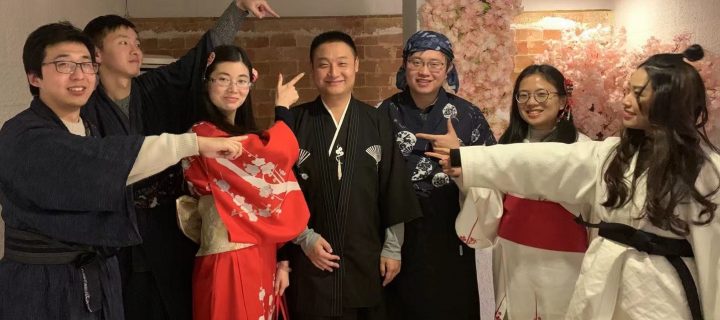After the explosive growth of the last five years, China now has the biggest larp business in the world.
The emergence of pervasive games in China, the largest game market all over the world, was very fast and drastic. The most popular examples, escape rooms (ERs), and murder mystery games (MMG) called jubensha (剧本杀, script murder) quickly conquered China’s urban youth.
The Short History of Chinese Murder Mysteries
Chinese crime genres like gong’an have entertained their readers with horror, suspense, and mystery solving for a long time and created the conditions for murder mystery games in China. Some sources say that deductive games like Werewolf were already part of the Chinese underground gamer scene when escape rooms entered China around 2012.
Then in 2013, a murder mystery boardgame named Death Wear White was imported into China, which some see as the origin of jubensha. Soon, a steady stream of original Chinese ‘script murders’ (e.g., the excellent The Magnificent Ambersons series) were produced. But they did not drawn mainstream attention until 2016, when Mango TV released a variety program named Who’s The Murderer, a South Korean reality TV import. Watching celebrities play jubensha became the coolest thing for Chinese youth.
During the pandemic of Covid-19, online jubensha applications became a popular form of social interaction and entertainment. Not restricted by time and space, it was a very convenient and efficient way to kill time and solve loneliness during quarantine periods.
Meanwhile, the booming escape room industry started to fuse jubensha with immersive spaces. During its first decade, Chinese escape rooms became more interactive and technologically enhanced, adding large-scale and high production value environments, narrative elements, player roles, and professional supporting characters to the mix, while allowing the players to influence the story and its ending. As a result, live-action jubenshas became very similar to North American and North European blockbuster larps, and an important link in the Chinese entertainment industry chain.

There’s a wide variety of commercial larp venues in China. Photo by Shuo Xiong.
Jubensha 101
Online and offline jubenshas have a very similar process. You can buy tabletop murder mystery games to play at home.
Most of the scripts are about a murder, but other genres like espionage, survival, and rom-com are slowly gaining ground. The players choose (or are assigned) a character with a detailed background. The studios and the app’s AR features usually provide authentic costumes. A Game Master facilitates the experience.
A jubensha usually involves three player roles: suspects, detectives and real murderers, with possible accomplices. Some complex scripts even have a mastermind behind the plot.
➔ Innocent suspects need to clear themselves and complete their own side quests;
➔ Detectives must investigate the case and find the murderer;
➔ Murderers must find a scapegoat and plant suspicion to escape the detectives.
The game usually contains two rounds of detecting. Players can search the crime scenes looking for hidden clues, then exchange information and discuss the mystery during a roundtable meeting. Finally, they vote on who is the murderer and conclude the game.
| 2016 | 2019 | 2021 | |
| Number of studios | 2000+ | 12000+ | 30000+ |
| Industry | ? | 1.5+ billion USD | 2.5+ billion USD |
The jubensha industry supports 2000+ script writers.

Atmospheric candles. Photo by Jingyu.
Advanced Form
A quite complex, larp-like jubensha that Ruoyu Wen experienced in Wuhan was themed after Dying Light, a famous video game about post-apocalyptic survival. The game site was set into a two-storey mini town, where every player character had different main storyline missions.
During “daytime,” players could walk around the town and get quests from supporting characters who would give water and food in return. These resources were recorded on smartphones and without them your character would die. During “nighttime,” players had to hide in houses to avoid zombies.
Just like in other open-world games, the players could chat freely and interact with each other and the NPCs. The immersive environment (uniforms, sound effect, supporting character actors, and scenery) made it a high-fidelity game experience.
From “Acquaintance” to “Stranger Entertainment”
On the surface, jubenshas are task-oriented. Solving the case is the core experience of the game. However, many play murder mystery games for social purposes.
Socialization in China was traditionally limited to acquaintances. Stranger socialization also relied on mutual acquaintances. However, social attitudes are changing among China’s youth. Anonymous social apps like TanTan (Chinese Tinder) made online stranger socialization more acceptable, and this had a profound effect on pervasive games.
Ten years ago, people only played escape rooms with their friends. They had to invite 6-8 of them to play. It was an obstacle. Today, apps and organizers bring together prospective players who don’t know each other. Pervasive games are an efficient and unembarrassing way for young people to meet, socialize and find common topics. The temporary set of social relationships and the dark and scary atmosphere helps to create trust between strangers, meanwhile the alibi provided by playing a character allows for safe ways to experiment with your behavior.
| A Recipe Immerse the following ingredients in a simmering pot of Chinese culture for a few years: ➔ Gong’an (or other Chinese crime genres) ➔ Death Wears White (or other murder mystery boardgames) ➔ Period dramas ➔ Werewolf (or other social deduction games) ➔ Escape rooms ➔ Hanfu fashion ➔ TV reality shows ➔ Role-playing |

There’s a wide variety of commercial larp venues in China. Photo by Shuo Xiong.
Larp In China
➔ Xiong’s previous survey of 292 players showed a balanced gender ratio and 83.3% of Bachelor’s degrees or above.
➔ The quality of scripts on the market is quite uneven, and intellectual property rights are often ignored.
➔ Some designers theorize that the majority of players still prefer simple murder mystery games and escape rooms to complex jubenshas because most people feel safe knowing that there is an answer and a disclosure. Freeform roleplaying is too social and too uncertain.
➔ Chinese companies started to use pervasive games not just for teambuilding, but for HR assessment and leadership development purposes.
➔ In 2022, state regulations on content of scripts appeared.
➔ Ruoyu predicts a renewed interest in pervasive games when AR/VR technologies and metaverses reach the next technological level.

Toasting the dead. Photo by Jingyu.
Cover photo: The cast of a Chinese larp. Photo by Shuo Xiong. Image has been cropped.
This article is published in the Knutpunkt 2022 magazine Distance of Touch and is published here with permission. Please cite this text as:
Xiong Shuo, Wen Ruoyu, and Mátyás Hartyándi. 2022. “The Chinese Hotpot of Larp.” In Distance of Touch: The Knutpunkt 2022 Magazine, edited by Juhana Pettersson, 86-89. Knutpunkt 2022 and Pohjoismaisen roolipelaamisen seura.






